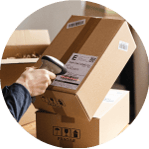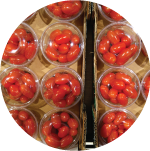
Packaging Challenges Are No Match for Hughes Enterprises.

We Are Hughes Enterprises, An Envoy Solutions Company
Since 1950, our team of packaging experts has helped companies streamline end-of-line processes through custom packaging equipment and consumables to support our customers' throughput and bottom line.
Partnering with leading industry suppliers, we help you meet your sustainability goals with technology-driven engineering and eco-conscious packaging supplies to maximize the protection of your products while minimizing the impact on your budget and the environment.
Careers with Hughes Enterprises
We’re always looking for bright, energetic people who want to make a difference for their customers, for their colleagues, and in their own lives. Is that you?
Click below to view regional career opportunities with Hughes Enterprises.
INDUSTRIAL PACKAGING SUPPLIES
Partnering with industry-leading suppliers, we deliver a wide variety of packaging materials, supplies, and solutions you need to operate your packaging equipment. Our experts can help you choose the right materials for the right application and equipment to maximize productivity and efficiency.
| Stretch Film Shrink Film Strapping Products Tapes, Tape Dispensers + Adhesives Customer Packaging Made to Order Corrugated Boxes + Rolls Protective Packaging Materials Mailing Bags + Envelops + Tubes Poly + Kraft Mailers Curbside Recyclable Mailers Poly Bags + Antistatic Bags + Poly Sheeting |
Edge Protectors |
EQUIPMENT
It’s the goal of many companies to ensure that their products consistently arrive on time and damage free. Hughes Enterprises specializes in designing and implementing customized packaging equipment solutions and full end-of-line automation in such areas as void fill; case sealing; case packing; case erecting and case forming; strapping; stretch wrapping; labeling; marking; and shrink wrap.
Automated Packaging System
Cappers/Fillers
Case Erectors
Case Labeling
Case Measuring System
Case Packaging System
Case Sealer
Hand-held and Tabletop Equipment
Industrial Bagging Systems
Industrial Printers
Palletizers
Protective Packaging Equipment
Reverse Logistics and Unpackaging Equipment
Shrink Wrapping Equipment
Strapping Machines
Stretch Wrappers
Tray Formers
Water-activated/Gum Tape Dispensers
Workstations & Packing Tables
INDUSTRIAL PACKAGING EQUIPMENT
It’s the goal of many companies to ensure that their products consistently arrive on time and damage free. Hughes Enterprises specializes in designing and implementing customized packaging equipment solutions and full end-of-line automation in such areas as void fill; case sealing; case packing; case erecting and case forming; strapping; stretch wrapping; labeling; marking; and shrink wrap.
| Automated Packaging Systems Stretch Wrappers Shrink Tunnels Case Sealing Equipment Strapping Machines Air + Paper Pillow Machines Form Fill & Seal Case Erecting Marking + Coding |
Industrial Printers |
EQUIPMENT SERVICES
There’s no one-size-fits-all approach to packaging. That’s why we deliver custom, integrated solutions. Whether your goal is to streamline operations, reduce equipment footprint, improve safety, or labor savings, we can help through careful planning, meaningful conversations, and thoughtful design. You tell us about your goals and budget, and our experienced consultants create packaging systems with your needs in mind.
| Maintenance + Repair Services On-site Consultation VMI + Stocking Logistics |
Custom Engineering Solutions |
PRODUCTS + SUPPLIES
Partnering with industry-leading suppliers, we deliver a wide variety of packaging materials, supplies, and solutions you need to operate your packaging equipment. Our experts can help you choose the right materials for the right application and equipment to maximize productivity and efficiency.
Adhesive
Corrugated Box and Supplies
Protective Packaging Materials
Safety Supplies
Tapes
Stretch Wrap Film
Shrink Wrap Film
Strapping Products
Mailers + Envelopes
Poly Bags + Poly Sheeting
Janitorial & Sanitary Supplies
Suspension & Retention Packaging
Curbside Recyclable Mailers
Foam in Place Packaging
SERVICES
There’s no one-size-fits-all approach to packaging. That’s why we deliver custom, integrated solutions. Whether your goal is to streamline operations, reduce equipment footprint, improve safety, or labor savings, we can help through careful planning, meaningful conversations, and thoughtful design. You tell us about your goals and budget, and our experienced consultants create packaging systems with your needs in mind.
Custom Engineering Solutions
Maintenance & Repair Services
National Packaging Programs
Hughes Enterprises Alliance Program
Vendor Management Inventory
Cold Chain Packaging
Expertise for More Effective Operations
For Hughes Enterprises, the partnership is about more than just packaging.
| STRATEGIC GUIDANCE We work alongside you to plan your packaging systems from start to finish. |
 |
RELIABLE 24-HOUR SERVICE Equipment downtime is inevitable. It's how your partners react to it that counts. |
 |
BACKED BY HISTORY Since 1950, we've grown a longstanding reputation for customer success. |

AUTOMOTIVE

CONTRACT PACKING

E-COMMERCE

FOOD PROCESSING

AGRICULTURE

MANUFACTURING

PHARMACEUTICAL

DISTRIBUTION + TRANSPORTATION
Sustainability
We understand that every business has its unique approach to sustainability when it comes to packaging.
As packaging experts, Hughes is ready to help you achieve your sustainability goals that fit your business model.
We partnered with top suppliers at the forefront of sustainability, along with the support of our packaging experts, who know and understand how to make sustainability work with all the necessary considerations. Our goal is the maximum possible protection for your products with the minimum impact on both your budget and the environment.
REDUCED
Achieve your sustainability goal by reducing the environmental impact of your packaging by minimizing the materials used and harmful side effects during the production process, including factors like carbon emissions or energy usage.
RENEWABLE
Selecting renewable resources over those with limited supply helps slow the depletion of materials used in the packaging process. It also ensures the resources needed to continue making that product and keeping it available for other needs.
RECYCLABLE
Make the end-user recycling process easier by choosing recycled or unused materials from other manufacturing processes, and reusing resources like water can contribute to your bottom line while minimizing environmental impact. It also reinforces consumer sustainability efforts and supports your company's sustainability goals.

ENVOY SOLUTIONS CARES
We strive to improve the quality of life for our people, make a positive impact on our planet, and champion important causes for the communities we serve.
Hughes Enterprises is proud to support the American Cancer Society in the central region.

ENVOY SOLUTIONS IN THE NEWS
Welcome to the Envoy Solutions Newsroom. Your information source for all our company’s latest announcements, media coverage, and human-interest stories.

INDUSTRY ASSOCIATION
Hughes Enterprises is a product packaging distributor of:
Packaging Distribution of America
3M Premier Service Industrial Product Distributor
 |

North American is proud to support the American Cancer Society in the central region.
We strive to improve the quality of life for our people, make a positive impact on our planet, and champion important causes for the communities we serve.

Green2Sustainable Recognition
Two Envoy Solutions companies, WAXIE Sanitary Supply, and North American Corporation, were the recipients of Green2Sustainable's 2022 Sustainability Recognition Plaque handed out each year at the ISSA Show® North America. The show was held in Chicago.


Uncovering the biggest issues of the day affecting your business and bringing you solutions.
Get Started!

